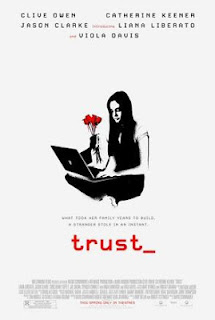Trust
Even though I found Trust, a 2010 film directed by David Schwimmer, to be moving and well acted and written, something gnaws at me about it. The film, a look at how a family is upended after a daughter is raped by an Internet sexual predator, certainly is not salacious, at least not to most of us. But an actual pedophile might find this film quite stimulating, and instructive.
Liana Liberato, in a stunning performance, plays Annie, a typical, if prettier than usual, fourteen-year-old. She has made a friend in an Internet chat room, their main shared interest volleyball. Annie's parents are Clive Owen and Catherine Keener, and all seems pretty good in their household, with Owen in particular seeming like the goofy, ineffectual dad. For her birthday, she gets a laptop. To Schwimmer's credit, there is no ominous music.
Annie then continues her chats with her friend, who calls himself Charlie. He reveals that he's really 20, not 16, and though this gives Annie some hesitation, she can't help but be flattered. He then confesses he's really 25, but by now they have extended their chats to be sexual in nature (we don't hear them, thank god). Then he flies into meet her, and she sees in he's in his 30s. Her first, correct, instinct is to run, but he plays on her insecurities, and lures her to a motel room. This scene, which is horrifying to most of the population, what with her in bra and panties, will also be masturbatory material to those the film is trying to condemn. I think the film would have been much more effective if this scene had been cut, and the rape more implied.
Annie's friend, trying to do the right thing, confides in a school administrator, and Annie's secret is out to her parents and police. The FBI is called in, but Owen tries to solve the case himself, going to pervert tracking websites. He becomes so consumed by this that he fails to comfort Annie, especially since she sees Charlie as her real love, despite being told he was just a predator.
This second half of the film is fascinating as Owen unravels. He's an ad man, and we subtly see how his campaign for teen fashion is in its own way contributing to the sexuality of little girls. Annie also becomes the victim of cyber-bullying, but this is not really followed up on.
I admire the intelligence and tact of this film, but am haunted by the realization that there are those among us who will see this film in an entirely different way. Men with this kind of sickness never see themselves as the monsters.
Liana Liberato, in a stunning performance, plays Annie, a typical, if prettier than usual, fourteen-year-old. She has made a friend in an Internet chat room, their main shared interest volleyball. Annie's parents are Clive Owen and Catherine Keener, and all seems pretty good in their household, with Owen in particular seeming like the goofy, ineffectual dad. For her birthday, she gets a laptop. To Schwimmer's credit, there is no ominous music.
Annie then continues her chats with her friend, who calls himself Charlie. He reveals that he's really 20, not 16, and though this gives Annie some hesitation, she can't help but be flattered. He then confesses he's really 25, but by now they have extended their chats to be sexual in nature (we don't hear them, thank god). Then he flies into meet her, and she sees in he's in his 30s. Her first, correct, instinct is to run, but he plays on her insecurities, and lures her to a motel room. This scene, which is horrifying to most of the population, what with her in bra and panties, will also be masturbatory material to those the film is trying to condemn. I think the film would have been much more effective if this scene had been cut, and the rape more implied.
Annie's friend, trying to do the right thing, confides in a school administrator, and Annie's secret is out to her parents and police. The FBI is called in, but Owen tries to solve the case himself, going to pervert tracking websites. He becomes so consumed by this that he fails to comfort Annie, especially since she sees Charlie as her real love, despite being told he was just a predator.
This second half of the film is fascinating as Owen unravels. He's an ad man, and we subtly see how his campaign for teen fashion is in its own way contributing to the sexuality of little girls. Annie also becomes the victim of cyber-bullying, but this is not really followed up on.
I admire the intelligence and tact of this film, but am haunted by the realization that there are those among us who will see this film in an entirely different way. Men with this kind of sickness never see themselves as the monsters.



Comments
Post a Comment